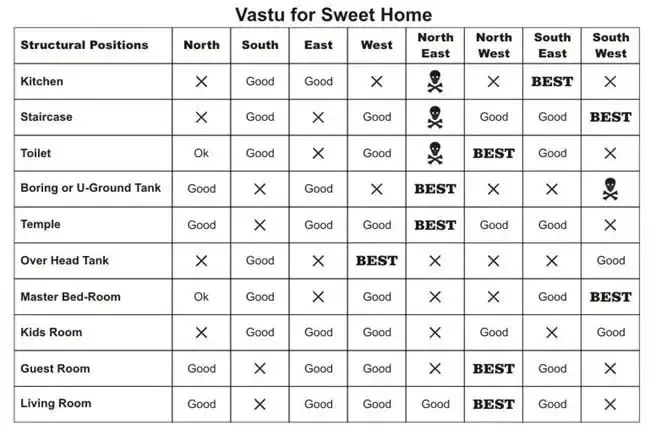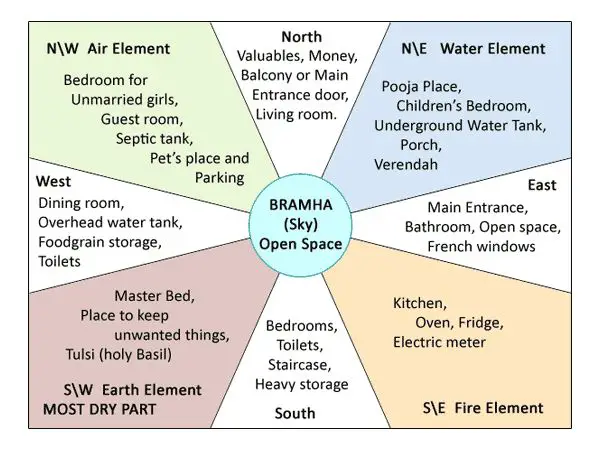Vastu Shastra is a body of scientific knowledge from ancient India that focuses on the idea of prosperity, it makes a clear connection between a person’s happiness with the design and construction of a structure.
Advocates of Vastu Shastra proclaim that it is the most reliable and scientifically proven form of advice.
Planetary energy, air, water, fire, and earth are five fundamental elements that make up all of nature, it can be utilized to synchronize one’s home and place of business.
In this article you’ll learn:
So, if you’re ready to go with a Vastu for home construction, this article is for you.
Let’s dive right in.
Introduction to Vastu Shastra:
A traditional branch of construction science that includes both philosophical and architectural theories.
Vastu is important in civil construction, and an engineer should be aware of it.
A lot of different types of buildings including homes, offices, and temples utilize Vaastu.
The ancient engineer Vishwakarma used the Vastu method, which has a long history to build forts, temples, and other historic structures.
It is the interaction of numerous solar system-related forces including land, wind, water, fire, and sky.
It is founded on a few atmospheric energies such as solar energy, earth energy, magnetic energy, wind energy, light energy, thermal energy, and cosmic energy.
The best positive outcome of using these kinds of energies in the construction of any room in the entire building, Vaastu can be taken into consideration.
The right Vastu room arrangement has a positive impact on the whole house or structure.
Vastu shastra is not just used for buildings, but it can be used to plan cities, homes, temples, businesses, towns, etc.
The only aspect of Vaastu depends on the environment’s system of sunlight and airflow.
Finding the North direction for the reference point is necessary before considering any other directions in Vastu because the magnetic line that is forced to move from north to south is thought to be favourable.

Relationship between Vastu and Civil Engineering:
According to the ancient engineer Vishwakarma, Vastu is a component of civil engineering that has no set expiration date used in every aspect of civil structures.
From the perspective of civil engineering, Vastu enables the engineer to display the proper direction of doors, windows, beds, bedroom designs, interiors, and entrances.
Earth, water, fire, air, and sky are the five elements that nature used to create all living things in the universe.
A harmonium cannot arise until these components are balanced.
It is a science of architectural design to balance all these elements for a living thing’s health and potential wealth.
Information about the direction a building or house faces is also helpful, the direction change affects the Vastu of the building or home.
Tips for Vastu Shastra in Construction:
Vastu Advice for Buildings and Homes Facing East:
- East-facing construction symbolizes the growth of life brought on by sunlight.
- The main entrance is the northeast corner, where sunlight enters the house directly.
- There will be more growth or life in terms of health and wealth where there are more sun-lit ambiances inside the home.
- The northeast or eastern corner should house the entryway, the hall, and the puja room.
- Dining and balconies ought to be on the south side.
- The southwest corner should be house the restrooms, stairs, and kitchen.
- The southwest corner should be house the main bedroom.
- Children’s bedrooms, bathrooms, and stairwells should be located in the northwest corner.
- The second entrance for an east-facing house/building should be located on the north side, near the east corner.
- The northwest corner can contain the balcony.
- In comparison to other sides or directions, the southwest corner should have higher flooring.
- More storage units such as cabinets or lockers must to be available in the southwest.
- The west side or south side walls should have cabinets or shelves for every room.
- southeast corner of the south side should have the kids’ bedroom door.
- The main bedroom should have its entrance on the east side, facing northeast.
- Doors for the bathroom should face the south or northeast corner.
- The bed in the bedroom should be located so that it touches the south side wall with the head and legs in the direction of the south.
- The primary gate entrance should be located at the northeast corner.
- When compared to the other sides, the southwest corner of the compound wall should have a higher height.
- When climbing the stairs, it is important to turn to the right side.
- It is ideal for the master bedroom to be bigger than the other spaces.
- The southwest corner should have an overhead tank because the Vastu requires that the corner support more weight.
Vastu In West Facing House/ Building:
- The main entrance or gates of a building or home are crucial.
- According to Vishwakarma, the god of Indian architecture, the main door shouldn’t be placed in the middle of the south wall because that spot is known as the Yama drawer.
- The main entrance shouldn’t be located in the southwest because that area is where negative energy tends to travel.
- Because positive energy moves from southeast corners that is the ideal location for the main door.
- The points mentioned in the East Facing Plan will also apply to West and North Facing houses.
- The main entrance in a north-facing home should be situated in the northeast corner or in the middle of the north wall.
- Negative energy refers to disruptions in family, wealth, and health as harmonious personal and professional relationships are all examples of positive energy.
- The head of the family or the owner of the home or building will pass away if the main door is positioned in the middle of the south wall.
As per Vastu shastra, the location of locations and their importance help the builder or engineer grasp Vastu principles.

East:
The house of Indra is located in the east.
The main entrance emits positive energy such as health and wealth.
South-east:
It is also referred to as the House of Bramha.
A kitchen or bathroom should be built here.
There should be no main door.
South:
This is also known as Yama’s house (the god of death).
The primary member of that family passed away as a result of the main entrance at the centre of the south wall.
Use the secondary door on the south wall, not the main one.
South-West:
The House of Wind is another name for it.
The main bedroom should be built here for peace and quiet.
This is also known as the House of Varuna or Lakshmi.
As per Vastu shastra, good fortune comes from the main entrance in the middle of the west wall.
North-West:
It is also known as the House of Vayu.
This is place where we keep heavy loads such as money and gold lockers.
You can save money longer time.
North:
It is also known as the house of kuber, after the god of money.
There should be no toilets or water drains in this area.
North-east:
It is also known as Shiva’s house.
It should be devoid of all constructions and open to the sky.
The more this side gives, the more health, wealth, and good family relations.
As per Vastu shastra, these are the things that should not be kept or done in the home:
- Never keep medicines in the kitchen because the kitchen is a place where health takes place, but keeping medicines in the kitchen provides negative energy that affects the healthy environment.
- Never maintain a mirror in front of the bed in the bedroom because while we are sleeping, we enter subconscious phases where the sole moves out and returns to the body when we awake.
- When the soul exits the body and enters the subconscious state, it should not look in the mirror.
- The sole will perish if it turns to face the mirror right after leaving the body.
- The bedroom should not have plants because they release carbon dioxide, which is harmful to one’s health.
- There should be no devil paintings or unnatural arts in the house.
- Waterfalls, frightful giants and demons, violent scenes, negative imagery, and so forth.
- Don’t build a beam in the middle of the room, and don’t build pillars inside the room.
- Avoids having pet cats in the house or office because they prefer negative energy environments.
- Do not watch television in your bedroom.
- On a king-size bed in a bedroom, separate mattresses and linens shouldn’t be used.
- Mirrors shouldn’t be present in the kitchen.
- No TV or computer should be placed directly opposite the bed.
- If the screen shows a reflection of the bed after turning off the television or computer monitor, this is a bad sign.
Also read: How to Build a False Wall for TV and Fireplace?
As per Vastu shastra, these are the things that should be kept or done in the home:
- After the bed is placed in the bedroom, the room should have less space on the south and west sides when compared to the east and north sides.
- Instead of in front of the bed, the mirror ought to be hung on the south corner wall.
- Maintain a window or a door in the northeast corner and keep the window in that corner always open.
- Place a Buddha or Ganesha statue in front of the main door.
- For best results, all god idols should face east.
- Rooms and houses should always be square or rectangular in shape and the wall should be in the 900 range.
- Airflow and sunlight should always be directed northeast.
- Adopt a pet dog because dogs prefer high-energy environments.
- Keep water bodies such as a flower-filled pot or bowl of water near the main entrance’s northeast corner.
- Make all decisions with your back to the north for the best results.
- For the best results, study facing east and north.
- Build a window or door for your puja room so that the morning sun shines directly on the idols inside that enhancing the strength of your prayers.
- The southwest corner wall must be higher than the walls pointing in the other directions.
Advantages of Vastu Shastra:
- Comfort.
- Inner Recognizing.
- Strength.
- Simple to Use.
- Optimal Use of Space.
- A Sturdy Framework.
- Make Someone’s Personality Better.
- Strengthen Interpersonal Connections.
- Gain Spiritual Awareness.
- Greater Mental Calm and Capability.
Disadvantages of Vastu Shastra:
- Vastu concepts have been associated with mythological facts since the Vedic era to encourage people to make better use of nature.
- If Vastu principles were followed while creating a home, there are many examples that could be utilized to live a very happy and prosperous life.
Also read: Principles of Planning | Town Planning | Compass Surveying
Conclusion:
Vastu Shastra compares the structure to the human body, it is a natural science that permeates all aspects of real life.
The five elements that are related to this environment are referred to as Vastu, it is the system that can balance all types of construction.
The theory presented above conditions that the vast is applicable to all aspects.

Related Posts
Rock Quality Designation(RQD): Building Strong Foundations
Spread Footing
Masonry Cement
Plain Cement Concrete
Concrete Efflorescence
Concrete Pile
Stepped Footing
Fineness Modulus of Coarse Aggregates
Difference between Condo and Apartment